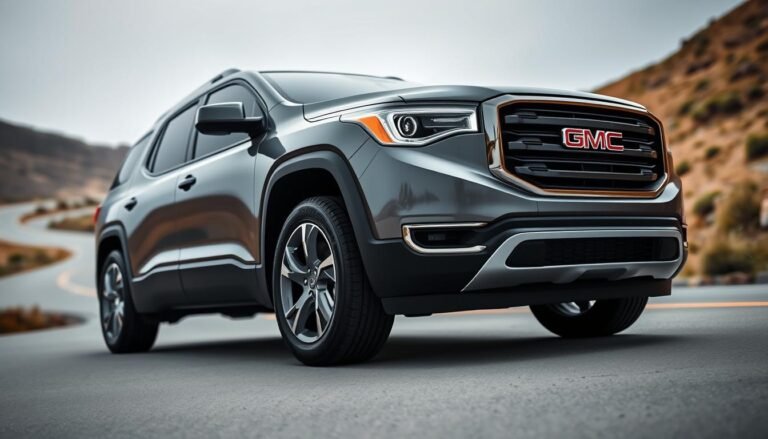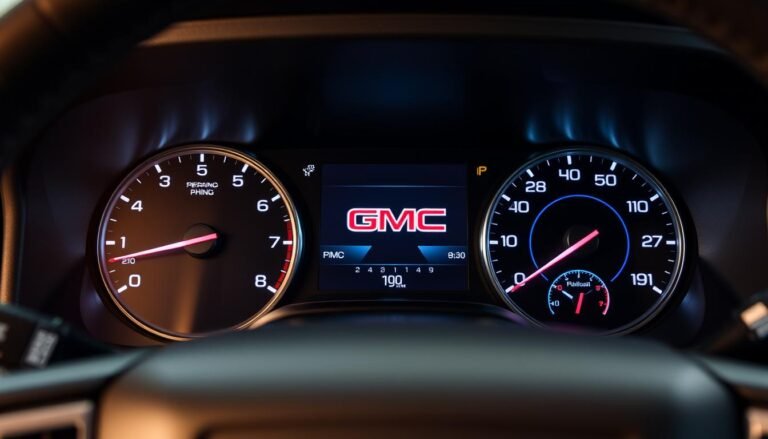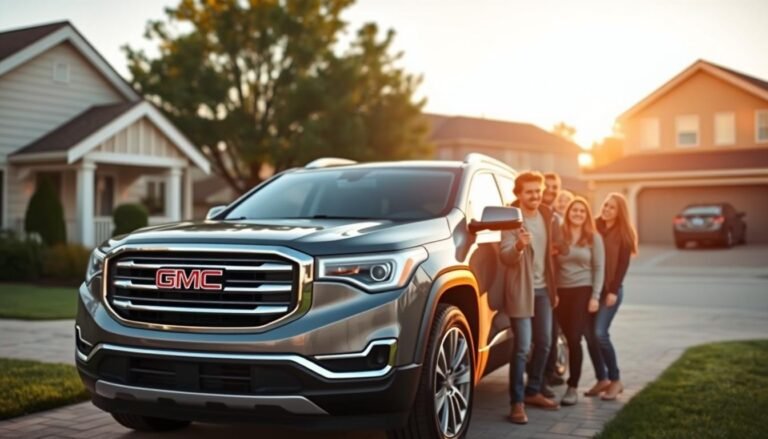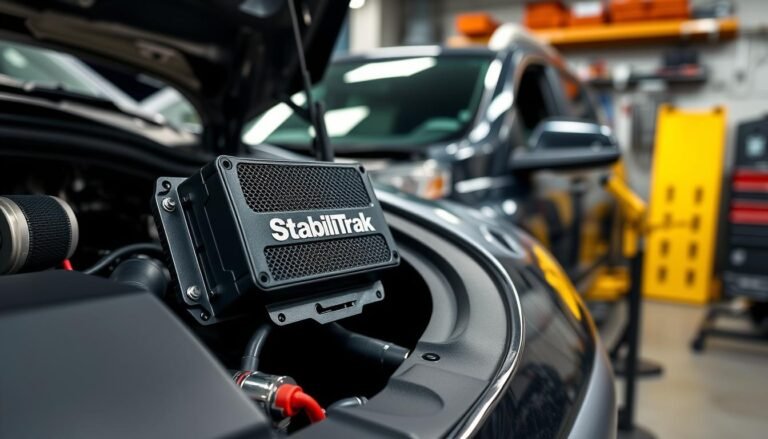GMC Yukon Years to Avoid – Buyer’s Guide
The GMC Yukon is a great full-size SUV loved by families. But it’s important to know which years to avoid to buy smartly.
Some model years have had big reliability issues, which could mean costly repairs later. We will look closely at the years 2003-2005, 2007-2013, and 2015-2016 because they had several mechanical problems.
We’ll talk about the common problems these models had, like transmission and engine troubles. You’ll learn about typical repair costs too.
Knowing these problems will help you choose a dependable GMC Yukon. It’s key to avoid certain years to prevent surprise repairs and enjoy your drive.
Now, let’s dig into the details about GMC Yukon generations. We’ll show you which years to skip. This will help you have a smooth ownership period.
Introduction to the GMC Yukon
The GMC Yukon has been a big name in full-size SUVs since 1991. It’s perfect for families and adventurers, competing with the Ford Expedition and Lincoln Navigator.
It offers room for up to nine people with its three-row seating. This SUV has a lot of space for luggage, which is great for trips.
It’s powered by strong V8 engines that can handle different terrains well. GMC has made the Yukon safer over the years, with better technology and materials to protect passengers.
This makes it great for families and for towing heavy things. In the last few years, more people have chosen the Yukon, making it very popular.
It has adapted to what drivers want, keeping its spot in the busy full-size SUV market.
What is GMC Yukon Generations?
The GMC Yukon has been around for nearly 30 years, starting in 1992. It’s a large SUV that has changed a lot, going through five GMC Yukon generations.
Knowing these generations helps buyers find out about issues with certain model years.
The breakdown of GMC Yukon generations includes:
- First Generation (1992-1999)
- Second Generation (2000-2006)
- Third Generation (2007-2014)
- Fourth Generation (2015-2020)
- Fifth Generation (2021-present)
The first generations, especially the first, might not be as reliable. They also might not have the features that people want today.
But the first-generation Yukon was important. It had a strong 5.7L V8 engine, making 210 hp and 300 lb.-ft. of torque.
Later generations brought new designs and tech. The Yukon got better with every new version. The second-generation started in 2000.
Then, each new generation kept improving. The latest, fifth-generation Yukons from 2021, have powerful engines like the 6.2L V8.
They also have cool things like Air Ride Adaptive Suspension, a first for SUVs. When looking at a GMC Yukon, learn about its generations.
Each one shows how the SUV has changed to meet what people need and how cars have evolved.

Common Issues with The GMC Yukon
The GMC Yukon is known for being reliable, but it does have its issues. Transmission failures are a big problem in older models.
Some years also have a problem with using too much oil. Plus, the tail lights often have issues, which can be unsafe.
In certain models, the heating and air conditioning don’t work as they should, breaking down too often. Knowing these issues helps buyers avoid expensive repairs and ensure a safer drive.
| Model Year | Common Issues | Notes |
|---|---|---|
| 1999 | High problem rate | Noted to have more issues than adjacent years |
| 2003-2005 | Transmission failures, excessive oil consumption | 2005 model generally performs better |
| 2015 | Tailgate light issues, A/C failures, excessive vibration | Highest number of complaints |
| 2016 | Wind noise, build quality concerns | Similar complaints to 2015 models |
Being aware of these common GMC Yukon problems is key to making a smart choice. Paying attention to complaints from GMC owners can also highlight potential issues. This knowledge can prevent bad experiences.
GMC Yukon Years To Avoid
When planning to buy a GMC Yukon, it’s critical to know which years had big problems. GMC Yukon problematic models have made buyers think twice because of their issues.
We will show you the years you should skip due to mechanical failures and complaints from owners.
Overview of Problematic Model Years
For those looking to buy, stay away from these years:
- 2003-2005: These models had big problems with their transmissions and used up oil too quickly.
- 2007-2013: People owning these complained about using too much oil and the dashboards cracking. This made them question the GMC Yukon’s reliability.
- 2015-2016: These years got a lot of complaints, mainly for lights at the back not working and air conditioning breaking down.
Key Factors Leading To Issues
There are a few reasons why these years had problems. Key factors include:
- Early designs missed some important details about how long parts should last.
- New features were added without enough tests to see if they worked right.
- Different factories making the parts at times meant the quality wasn’t consistent.

Second Generation (2000-2006) Issues
The second generation GMC Yukon from 2000 to 2006 offered better features and stronger performance.
Yet, the models from 2003 to 2005 had many reliability issues. These problems made owners less satisfied and less confident in their vehicles.
Model Years To Avoid: 2003-2005
For the years 2003 to 2005, these Yukons had more problems than other years. They didn’t score well in reliability.
Issues were mostly with the transmission, especially the 4L60-E automatic transmission. This issue was costly to fix. Also, the 5.3L Vortec V8 engine used a lot of oil. Fixing it in advance could cost about $3,000.
Common Problems during 2003-2005
Besides transmission and engine troubles, there were more issues during 2003 to 2005. Some common problems were:
- Transmission failures with signs like clunking, whining, and slipping.
- Oxygen sensor failures tied to trouble codes P0171, P0174, and P0300. These indicated air-fuel ratio issues.
- Electric system errors, especially in the instrument clusters for models from 2003-2004.
- Knock sensor issues, showing in check engine lights and codes P0327 and P0332.
- Oil pressure sensor problems that caused unpredictable gauge readings.
- Steering intermediate shaft failures that needed a real fix after around 5,000 miles of short-term solutions.
These issues all together made the 2003 to 2005 second-generation GMC Yukons less reliable. If you’re thinking about getting one, consider these problems to avoid future headaches.

Third Generation (2007-2014) Concerns
The GMC Yukon’s third generation, from 2007 to 2014, has a mixed reputation. Some years are well-liked, but others, specifically from 2007 to 2013, have significant issues. These issues are important to know about before buying.
Model Years to Avoid: 2007-2013
From 2007 to 2013, these Yukon models have big problems. The 2007 models, for example, use too much oil, which can cause engine issues and expensive repairs.
The Active Fuel Management (AFM) system also causes engine misfires and makes ticking noises. This problem leads to less power and reliability.
Plus, interior parts and accessories often break, making the experience less enjoyable for owners.
Known Defects and Reliability Issues
New technologies that weren’t properly tested are a big reason for the troubles with these models. Here are the major problems and reliability issues for the third-generation GMC Yukon:
- High oil consumption, especially in the 2007 model.
- Issues with the Active Fuel Management system that lead to engine problems.
- Interior components and accessories that fail often.
These issues show a troubling pattern for those looking at the third-generation GMC Yukon. Knowing about these concerns can help you make a smarter choice when looking for a used car.

Fourth Generation (2015-2020) Reliability
The fourth generation of the GMC Yukon focused on better reliability after past problems. But, the 2015 and 2016 models still had major issues.
It’s important for buyers who want a durable and hassle-free car to know about these problems.
Model Years To Avoid: 2015-2016
The 2015 Yukon has the most complaints, over 800. Owners were upset about taillight and air conditioning failures.
The 2016 Yukon also had troubles, especially with its new 8-speed transmission. This caused rough shifting and shaking.
Common Problems in The 2015-2016 Models
Beyond the transmission, these models faced more issues. Tires wore out unevenly before 30,000 miles, demanding expensive replacements.
The dashboard’s poor quality affected performance and satisfaction. Thus, the 2015-2016 Yukons had significant challenges, despite later improvements.
Fifth Generation (2021-Present) Improvements
Since 2021, the GMC Yukon stepped into its fifth generation with big improvements. It boasts a new independent rear suspension for better ride and handling.
The interior got a makeover with top-notch tech, including cutting-edge infotainment and safety upgrades. These changes make driving a new Yukon a top-notch experience.
Owners of the latest models give them high marks for reliability from 2021 onwards. Though new cars might have small issues, these Yukons are built to last with regular care.
They offer a mix of luxury and high performance that’s hard to beat. Plus, the powerful 420-horsepower 6.2-liter V8 engine adds to its appeal, blending power with comfort beautifully.
The table below summarizes key specifications and performance attributes of the fifth-generation GMC Yukon:
| Model | Engine Options | Horsepower | Towing Capacity | Seating Capacity |
|---|---|---|---|---|
| GMC Yukon | 5.3L V8 / 6.2L V8 / 3.0L Diesel | 355 hp / 420 hp / 305 hp | 8,200 lbs (AT4 trim) | Up to 9 passengers |
Problems Found in Older GMC Yukons
If you’re looking at older GMC Yukons, keep an eye out for issues that could affect your ride. Early models often have structural problems, like rust on the frame.
This could make them unsafe as they age. Transmission problems are also common, especially in models made before 2007.
These issues can be expensive to fix, so check the SUV well before buying. The 2015 Yukon has a lot of complaints, mainly about the A/C breaking down, costing about $1,000 to repair.
Other frequent problems include:
- Tailgate light issues often requiring complete fixture replacements.
- Excessive oil consumption, which is common in older models but usually doesn’t cause major problems.
- Transmission-induced excessive vibrations, a less common issue but still a concern.
Older GMC Yukons with many miles might have questions about how well they were maintained.
The 5.3 V8 engine, especially in the 2007 and 2008 models, may have lifter issues after 100,000 miles.
However, models with a 4.8 or 6.0 engine without active fuel management often last longer with fewer problems. When considering a used SUV, it’s wise to look closely at its service history and past owners.
This can help you avoid potential issues with an older GMC Yukon. Making a careful choice can keep you from reliability and maintenance troubles later.
| Model Year | Main Issues | Reliability Rating |
|---|---|---|
| 1999 | Structural integrity, rust | Moderate |
| 2001 | Fuel system failures | Low |
| 2003 | Electrical system problems | Moderate |
| 2005 | Less troublesome, some issues noted | Fair |
| 2007 | Lifter problems | Low |
| 2015 | A/C failure, excessive complaints | Very Low |
| 2016 | Power steering loss | Low |
Best GMC Yukon Model Years To Consider
Finding the best GMC Yukon model years can make buying a car much better. The most reliable years to look at are:
- 2001: This second-generation model gets few complaints, making it a great pick.
- 2012: Part of the third generation, it has low owner complaints, which is good.
- 2017-2020: These fourth-generation models are more reliable and perform better.
These years mix good performance, reliability, and up-to-date features well. Picking models from 2010 onwards is smart because they last longer and work more efficiently.
Older models are cheaper but might use more gas and be less reliable due to more miles and wear.
Below is a table comparing these GMC Yukon model years:
| Model Year | Generation | Common Issues | Owner Satisfaction |
|---|---|---|---|
| 2001 | Second Generation | None significant | High |
| 2012 | Third Generation | Few minor issues | Very High |
| 2017 | Fourth Generation | Minimal issues reported | Excellent |
| 2018 | Fourth Generation | Improved reliability | Excellent |
| 2019 | Fourth Generation | Few minor complaints | Excellent |
| 2020 | Fourth Generation | Minimal issues reported | Very High |
Choosing these top GMC Yukon years improves your chances of getting a good SUV. It also makes owning it more enjoyable.
Conclusion
When you think about getting a GMC Yukon, it’s key to really look into the different years and their issues. Avoiding the bad years means your money is well spent on something reliable.
This guide has shown you which models are good and which ones to think twice about, helping you pick the best option for your family.
For example, the 2011-2013 and 2017-2019 models are great choices for a used SUV. But, you should be careful with the 2007-2009, 2010, and 2014 models because they often have problems.
Knowing this helps you choose a Yukon that will perform well and keep its value. Finally, understanding the common issues with certain years, like electrical or transmission problems, is super important.
This knowledge prepares you to find the best GMC Yukon. A car that will be comfortable and safe for a long time.
FAQs
What are the GMC Yukon years to avoid?
Stay away from the 2003-2005, 2007-2013, and 2015-2016 Yukons. They have had issues like transmission problems, high oil use, and bad parts.
What common problems are reported in the GMC Yukon?
Owners often report problems with the transmission, high oil consumption, lighting issues, and heating and AC failures.
Which model year of the GMC Yukon is the worst for reliability?
The 2015 Yukon is known for being unreliable. Main complaints include problems with taillights and the air conditioning.
Are there any GMC Yukon models known for their reliability?
Yes, the 2001, 2012, and 2017-2020 models are praised for being reliable. They have fewer complaints from owners.
What features improve in the latest GMC Yukon models?
Newer Yukons have an independent rear suspension, better tech, and more safety features. These improve how the car rides and handles.
How can I ensure a used GMC Yukon is in good condition?
Do a detailed check and ask for the maintenance history. This helps find any old problems or fixes, especially in the older Yukons.
What are the known defects in the GMC Yukon?
Common issues include transmission problems, too much oil use, and faults with the Active Fuel Management system in the third-gen models.







